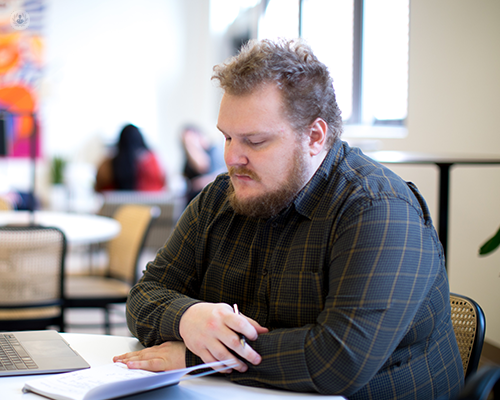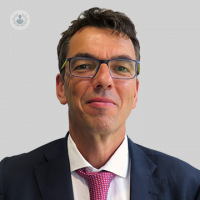Obesity surgery during the COVID-19 pandemic
Escrito por:If you’re obese, your risk of severe COVID symptoms is higher than the average person. Mr Bart Decadt is a consultant bariatric surgeon who has helped countless patients overcome obesity. In this article, he highlights the additional threat obesity causes in the COVID-19 pandemic and explains how bariatric (weight loss) surgery can help you lower this threat.

Are COVID-19 symptoms generally mild?
Coronavirus disease 2019 (COVID-19), caused by SARS-CoV-2, follows a biphasic pattern of illness (meaning it has two distinct phases): there is an early viral response phase followed by an inflammatory second phase. Most symptoms are mild viral symptoms, but some patients progress to having a severe and critical illness that can involve a high risk of death.
Is obesity a big risk factor for serious COVID-19 symptoms?
Yes, obesity is a risk factor for serious COVID-19 symptoms. Adipokines are proteins produced by visceral (abdominal) and subcutaneous (under the skin) fatty tissue. Obese patients have higher blood levels of pro-inflammatory adipokines and lower levels of anti-inflammatory adipokines, which results in lower B and T cell immunity. This B and T cell immunity is important for fighting off the virus.
A reduced immune response in obese and obese-diabetic patients results in a higher risk of:
- Catching the virus.
- A delay in overcoming the virus.
- A higher incidence of serious symptoms.
- A higher incidence of mortality.
Also, obese patients are more contagious (their risk of infecting other people is higher) and they have a lower antibody production and immunity following influenza-type vaccination, which suggests they’ll have a similar lower immunity response after having the COVID-19 vaccination.
How can obesity be treated to lower the risks of serious COVID-19 symptoms?
A combination of preventive measures, such as physical distancing along with testing, tracing and prolonged self-isolation appear all to be helpful in avoiding serious COVID-19 symptoms in obese patients. There are several actions obese people can take before and after they receive the vaccine.
1. Lose weight
Losing weight with a mild caloric restriction remains important.
2. Boost immunity with exercise
Physical exercise (fit-walking, swimming, biking, jogging) boosts the immunity in both obese and non-obese people, and so it remains very important.
3. Take certain medications (if obese and diabetic)
Certain drugs (such as Metformin and Pioglitazone) can be prescribed in obese-diabetic patients (as long as there is no indication that the drug is unsuitable) and have anti-inflammatory proportions which would be protective in case of COVID-19 infection.
4. Consider obesity surgery
Obesity surgery remains the only effective treatment with sustained long-term weight loss, which results in the additional benefit of lowering the risk of COVID-19-associated complications. Obesity surgery is extremely safe (it has lower mortality compared to laparoscopic cholecystectomy, for example) and generally involves a hospital stay of only one night. The most commonly performed procedure is a laparoscopic sleeve gastrectomy and all patients are followed up for two years by a bariatric team including a surgeon, nurse and dietician. I go more in-depth about bariatric (weight loss) surgery aftercare here.
How can I have obesity surgery during the COVID pandemic?
The pandemic has reduced theatre capacity in most hospitals. In view of the increased COVID-19 related risks in obesity, obesity surgery has been prioritised under my care and surgery is being performed in a safe COVID-free hospital with all staff working in full personal protective equipment and being tested regularly. Obesity surgery should be encouraged during this pandemic because sustained significant weight loss following obesity surgery appears to be one of the most effective factors in the prevention of COVID related complications.
Mr Decadt performs all routine bariatric and diabetic surgical procedures. Visit his profile to learn how his professional expertise can help you overcome obesity.


